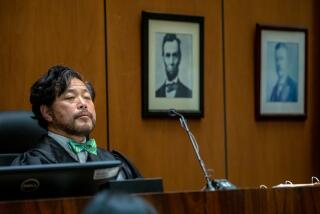The ACLU vs. Steve Cooley
The landmark 1963 Supreme Court decision in Brady vs. Maryland requires that prosecutors turn over to defense attorneys any evidence that could help a defendant prove his innocence and prevent a miscarriage of justice. Making sure that “exculpatory” evidence is shared with the defense is fundamental to a fair trial.
The Los Angeles County district attorney’s office under Steve Cooley has been known for the seriousness with which it takes the Brady requirement. A decade ago, in the aftermath of the LAPD’s Rampart scandal, Cooley convened a group of experts, including defense attorneys, and carefully worked out a policy to address the treatment of Brady material. In endorsing Cooley for state attorney general two years ago, this page noted that his Brady policy has served as a model for other agencies around the country.
So it came as a surprise — and Cooley was understandably miffed — when the American Civil Liberties Union recently filed a lawsuit alleging that his policy is in fact a sham, and that prosecutors in his office routinely conceal evidence from criminal defendants that could potentially be helpful to their cases.
At the heart of the dispute is what Cooley calls the Brady Alert System, a database of negative information about law enforcement officers and government-paid expert witnesses — information that has come to the attention of the district attorney’s office that could potentially undermine their testimony at trial, and that could mean the difference between a conviction and an acquittal. This might include, for instance, a finding of misconduct on the part of a sheriff’s deputy that reflects on his truthfulness, or evidence that a police officer has a racial or religious bias. Prosecutors are supposed to access the Brady Alert System at least 30 days before a case goes to trial to see if there’s any information they need to turn over.
All good, in theory. The problem is that the district attorney’s office won’t let just any information into the database. Arguing that the system shouldn’t include unsubstantiated or noncredible allegations, Cooley has insisted that there must be “clear and convincing evidence” that the information is reliable before it is put in the file. That means the evidence must be “so clear as to leave no substantial doubt.” Cooley says this is necessary under the state’s Public Safety Officers Procedural Bill of Rights Act and other state laws that protect law enforcement officers.
The ACLU says there is absolutely no justification for keeping material out of the database, and therefore out of the hands of the defense. Exculpatory evidence must be turned over, period. Ultimately, the courts will decide whether the ACLU or Cooley is right, and whether the “clear and convincing” standard is constitutional under Brady.
In our view, even if a court eventually finds it allowable, the standard should be loosened. Judges have repeatedly held that it is not the job of the prosecutor to determine the truth of exculpatory evidence; that decision should be made in the courtroom by a judge and jury.
Why shouldn’t prosecutors make such decisions? For one thing, a prosecutor might look at a piece of evidence casting doubt on a police officer’s credibility and find it unconvincing, but a judge or jury might examine the same evidence and believe it, leading to an acquittal. For another, prosecutors have incentives to win cases and should not be offered easy opportunities to withhold information that could help defendants.
Instead of requiring “clear and convincing evidence” that information is true before putting it in the database, the district attorney’s office could, for instance, require only that a “preponderance of the evidence” suggests it is true. That lower standard would be sufficient to keep out rumors and utterly unfounded charges.
If practicable, we’d also like to see more decisions about what evidence is or is not subject to the Brady rule made by judges and fewer by prosecutors. Surely these decisions can be made more fairly by an impartial third party.
Cooley deserves credit for drafting a thorough Brady policy. But it can be improved and should be revised, given how high the stakes are. Criminal defendants have a constitutional right to a fair trial, and the courts and prosecutors have an obligation to ensure they get one.
More to Read
A cure for the common opinion
Get thought-provoking perspectives with our weekly newsletter.
You may occasionally receive promotional content from the Los Angeles Times.










